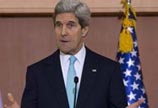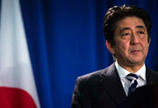Seoul must appreciate Washington's efforts to help it reset its relations with Tokyo. As Kerry noted, positive relations between them are in the best interests of not only Washington and the region but the two countries themselves.
|
 |
|
 |
As Yun pointed out, it was Japanese leaders' "regressive" remarks and reckless behavior that were to blame for the current icy Seoul-Tokyo relationships.
As has been widely reported, officials in Seoul and Tokyo were promoting a summit in December.
But Abe poured cold water on their efforts by unexpectedly visiting the Yasukuni Shrine, the potent symbol of Japan's prewar militarism.
Abe also drew fire from around the world by refusing to acknowledge Japan's wartime actions as "aggression".
On top of that, officials who were recently appointed by Abe to lead the NHK, Japan's influential public broadcasting network, made outrageous remarks. For instance, Katsuto Momii, the new NHK boss, played down the wrongdoing Japan had committed against "comfort women - sex slaves for its soldiers - during World War II, by saying that the practice was common in every country during wars.
As long as historical provocations of this sort continue, a summit between the two countries is not only meaningless but undesirable. So Washington's efforts to help Seoul and Tokyo improve ties should be focused on pressing Japan to create an environment conducive to dialogue.
Otherwise, Washington could give the impression that it is taking Japan's side in the intensifying dispute over history between the two nations. In fact, it was this consideration that prompted Washington to alter Obama's Asia itinerary.
Seoul was originally not included in Obama's trip. But Washington included it by shortening his stay in Japan. The message was unmistakable - Japan should take action to improve ties with its neighbors.
The author is chief editorial writer of The Korea Herald. The views do not necessarily reflect those of China Daily.
